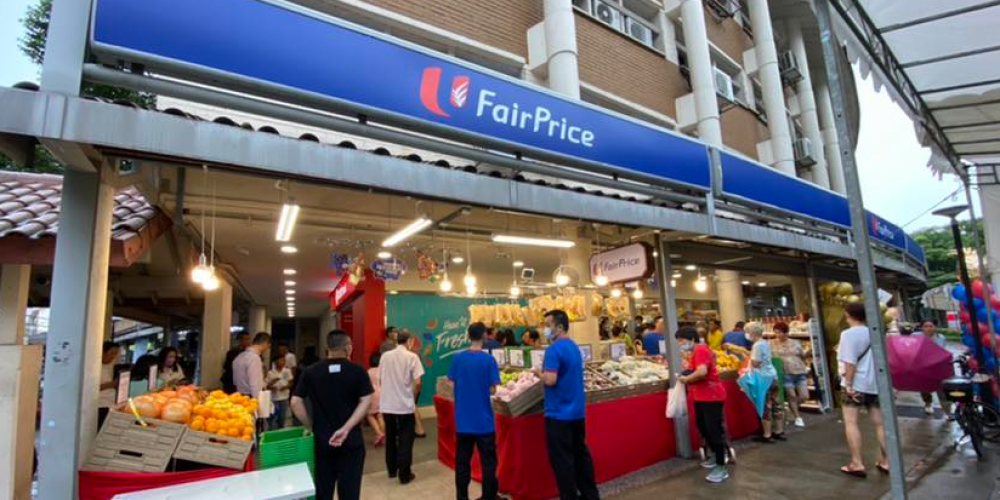Follow us on Telegram for the latest updates: https://t.me/mothershipsg
Charges for disposable carrier bags will commence at supermarkets from July 3, 2023 said the Second Minister of State for Sustainability and the Environment (MSE) Amy Khor during the Committee of Supply debates on Mar. 2.
"By making the cost of disposable bags visible to consumers, the charge will nudge consumers to be mindful of and reduce their usage of disposable bags," Khor said.
Carried out in larger supermarkets
Larger supermarket operators with an annual turnover of more than S$100 million will be required to charge a minimum of five cents for each disposable carrier bag at SFA-licensed supermarket outlets.
A joint press release by the National Environmental Agency (NEA) and the MSE on Feb. 6 wrote that these operators "would be more well-resourced to implement the requirements".
This covers 400, or about two-thirds of all supermarket outlets in Singapore, including NTUC FairPrice, Cold Storage, Giant, Sheng Siong and Prime supermarket outlets.
This mandatory charge will not apply to other retail outlets such as convenience stores.
Nevertheless, many retailers, including large convenience store chains such as 7-Eleven and Cheers, are already charging for bags voluntarily, Khor noted.
MSE will be monitoring the effectiveness of the charge and assess the need to expand the mandatory coverage in the future.
Disposable carrier bags
The charge will apply to disposable carrier bags of all material types: paper, plastic and degradable materials.
Disposable carrier bags are the ones with handles, such as t-shirt bags, and die-cut or punched handle bags.
Disposable non-carrier bags, such as flat-top plastic bags for bagging fresh produce, meat or seafood will not be subjected to the charge.
Khor highlighted that similar schemes in Hong Kong, Taiwan, and the U.K. have led to a reduction of plastic bags used by 60 per cent to 90 per cent.
To publish information on bag charges
Addressing concerns that supermarket operators might profit from the charge, Khor said, "I am happy to share that all covered supermarket operators have indicated that they intend to apply the charge proceeds towards environmental and social causes."
For transparency and accountability, the supermarkets will be required to publish information on the number of bags issued, the amount of proceeds collected, and how the proceeds are used, she added.
Environmental impact
The charge is kept low to moderate the cost impact on shoppers while encouraging them to be mindful of their disposable carrier bags usage, NEA explained.
Disposables have an impact on the environment during their production, transportation and disposal.
In addition, those used in Singapore are either recycled or incinerated, instead if being landfilled directly.
This means that the potential environmental benefits of using biodegradable materials like paper cannot be realised in Singapore.
Applying the charge only to carrier bags of certain materials may result in undesirable behaviours such as switching to a material that is not subjected to a charge.
Legislative frameworks
Legislative amendments to address packaging and food waste were proposed in the Feb. 6 parliamentary sitting.
The amendments, introduced under the Resource Sustainability (Amendment) Bill, propose legislative frameworks for three measures: a disposable carrier bag charge, a beverage container return scheme, and a food waste reporting framework.
This seeks to reduce packaging and food waste and aim to drive behavioural changes across Singapore to reduce waste and increase recycling.
The measures will contribute to the national targets under the Singapore Green Plan 2030 and the Zero Waste Masterplan, which is to reduce the amount of waste sent to the landfill per capita per day by 30 per cent, and to increase the national recycling rate to 70 per cent by 2030.
According to NEA and MSE, they will also help to extend the lifespan of Semakau landfill, Singapore's only landfill.
Top photo from NTUC FairPrice/FB.
Psssst! Follow us on LinkedIn for more stories like these.
If you like what you read, follow us on Facebook, Instagram, Twitter and Telegram to get the latest updates.
